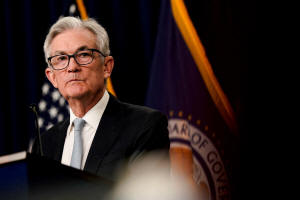Fed's Powell: Rate hikes to slow, but adjustment just beginning
 Send a link to a friend
Send a link to a friend
 [December 01, 2022] By
Howard Schneider and Ann Saphir [December 01, 2022] By
Howard Schneider and Ann Saphir
(Reuters) - Federal Reserve Chair Jerome Powell on Wednesday said it was
time to slow the pace of coming interest rate hikes while also signaling
a protracted economic adjustment to a world where borrowing costs will
remain high, inflation comes down slowly and the United States remains
chronically short of workers.
In an hour-long session of prepared remarks and questions at the
Brookings Institution think tank - his last scheduled appearance before
the central bank's next meeting in two weeks - Powell gave a short-term
message that sent markets soaring: The Fed was "slowing down" from the
breakneck pace of three-quarter percentage point rate hikes that have
prevailed since June, and would feel the way towards the peak interest
rate needed to slow inflation to the Fed's 2% target.
But he also outlined longer-term shifts that may be underway - in the
supply of labor in particular - that could presage a long period of
elevated interest rates and inflation that responds only slowly to the
Fed's restrictive policy. At the same time, he rejected the idea that
the central bank was so intent on calming the highest inflation in 40
years that policymakers would "crash" the economy in that effort,
insisting that a "soft or softish" landing remained possible, with
inflation easing without a dramatic rise in unemployment.

"We wouldn't...try to crash the economy and then clean up afterward,"
Powell said, with policymakers hoping not to "overtighten...because we
think that cutting rates is not something we want to do soon. That's why
we're slowing down and going to try to find our way to what that right
level is" that lowers inflation over time.
Combined the remarks showed the Fed grappling with some of the
longer-term trends that were amplified by the pandemic, particularly the
demographic drag that an aging population, COVID-era retirements, and
weak immigration are having on the labor force.
Those won't reverse soon, Powell said, acknowledging that a tight labor
market will have to be brought into balance mostly by Fed actions that
lower the demand for workers - either through a drop in job vacancies
or, as some fear, a rise in unemployment.
"I think for now we have to assume," that labor supply won't rebound,
Powell said. "We have to do what it takes to restore balance in the
labor market to get back to 2% inflation...really just by slowing job
growth rather than putting people out of work."
Those sorts of structural concerns have been in the background of Fed
debate since the early days of the pandemic, but are moving to the fore.
Concerns about global supply chains, for example, were considered
fleeting at first, likely to pass and help fix high inflation as they
did.
But progress has been slower than expected, with China in particular now
undergoing successive lockdowns that have made it a less secure source
of goods, and U.S. labor force participation still depressed.
'LONG WAY TO GO'
Powell's remarks about a coming downshift in the pace of rate increases
ignited a robust rally in equity and bond markets, which have taken a
pounding this year on the back of the Fed's aggressive rate hikes.
[to top of second column] |

Federal Reserve Chair Jerome Powell
holds a news conference in Washington, U.S., November 2, 2022.
REUTERS/Elizabeth Frantz/File Photo

The benchmark S&P 500 index shot into positive territory and closed
3.09% higher, and bond yields, which move in the opposite direction
to their prices, all tumbled. The yield on the 2-year Treasury note,
the maturity most sensitive to Fed rate expectations, dropped to
about 4.37% from 4.52%. The dollar weakened against a basket of
major trading partners' currencies.
In rate futures markets, traders added to the prevailing bets that
the Fed would slow its pace of rate hikes at its meeting in two
weeks.
"You can't keep raising rates as quickly as they were doing it,"
said Rick Meckler at Cherry Lane Investments in New Vernon, New
Jersey. "That said, investors always like the comfort of hearing it
directly from the (Fed) chair."
Still, and despite the coming slowdown in the pace of rate
increases, Powell said it remained an open question "how much
further we will need to raise rates to control inflation, and the
length of time it will be necessary to hold policy at a restrictive
level."
While the Fed chief did not indicate his estimated "terminal rate,"
Powell said it is likely to be "somewhat higher" than the 4.6%
indicated by policymakers in their September projections. He said
curing inflation "will require holding policy at a restrictive level
for some time," a comment that leaned against market expectations
the U.S. central bank could begin cutting rates next year as the
economy slows.
The central bank meets again on Dec. 13-14. Along with approving an
expected half-point rate increase policymakers will issue new
projections for rates, economic growth, inflation and unemployment
in coming years.
With the coming half-percentage-point increase the central bank will
have lifted its overnight policy rate from near zero as of March to
the 4.25%-4.50% range, the swiftest change in rates since former Fed
Chair Paul Volcker was battling an even worse rise in prices.
That has not, however, had a convincing impact yet on inflation.
Powell said Fed estimates of inflation in October showed its
preferred measure still rising at about triple the central bank's 2%
target.
He noted that while goods inflation has been easing, the cost of
housing is likely to continue to rise into next year, while key
price measures for services remain high and the labor market tight.
Data released earlier on Wednesday showed there were still about 1.7
job openings for each unemployed person.

"Despite some promising developments, we have a long way to go in
restoring price stability," Powell said. "We will stay the course
until the job is done."
(Reporting by Howard Schneider; Additional reporting by Caroline
Valetkevitch; Editing by Paul Simao and Andrea Ricci)
[© 2022 Thomson Reuters. All rights
reserved.]
This material may not be published,
broadcast, rewritten or redistributed.
Thompson Reuters is solely responsible for this content. |